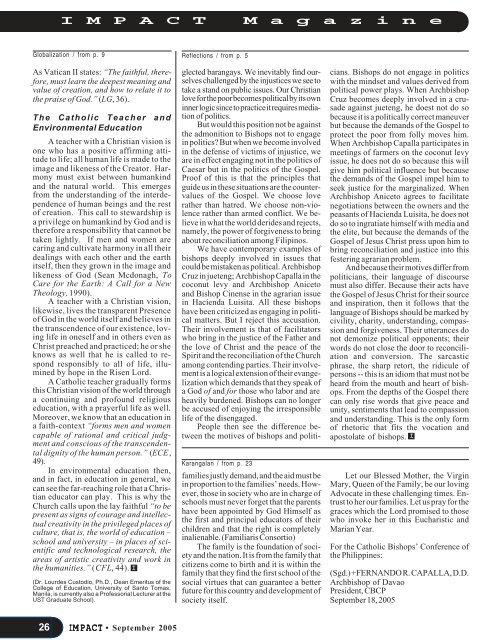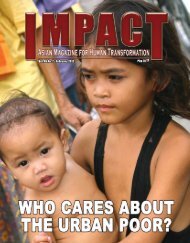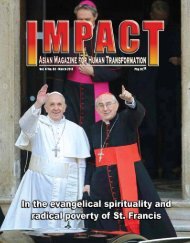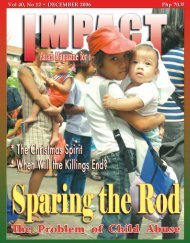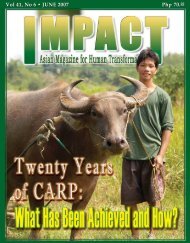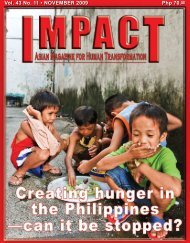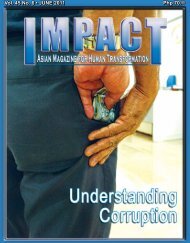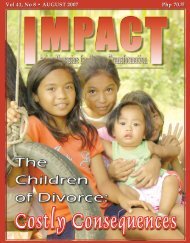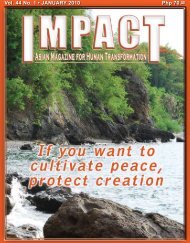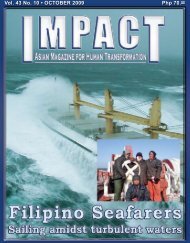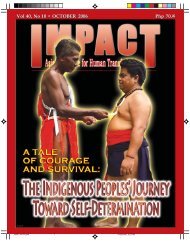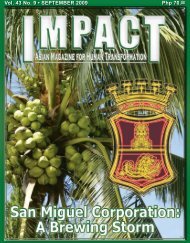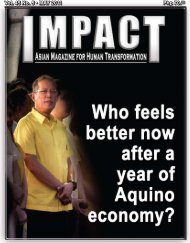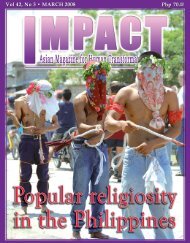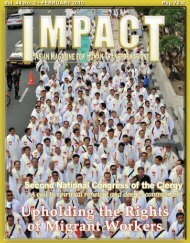SEPTEMBER 2005 Vol 39, No 6 • Php 70.00 Php 70.00 - IMPACT ...
SEPTEMBER 2005 Vol 39, No 6 • Php 70.00 Php 70.00 - IMPACT ...
SEPTEMBER 2005 Vol 39, No 6 • Php 70.00 Php 70.00 - IMPACT ...
- No tags were found...
Create successful ePaper yourself
Turn your PDF publications into a flip-book with our unique Google optimized e-Paper software.
I M P A C T M a g a z i n e<br />
Globalization / from p. 9<br />
As Vatican II states: “The faithful, therefore,<br />
must learn the deepest meaning and<br />
value of creation, and how to relate it to<br />
the praise of God.” (LG, 36).<br />
The Catholic Teacher and<br />
Environmental Education<br />
A teacher with a Christian vision is<br />
one who has a positive affirming attitude<br />
to life; all human life is made to the<br />
image and likeness of the Creator. Harmony<br />
must exist between humankind<br />
and the natural world. This emerges<br />
from the understanding of the interdependence<br />
of human beings and the rest<br />
of creation. This call to stewardship is<br />
a privilege on humankind by God and is<br />
therefore a responsibility that cannot be<br />
taken lightly. If men and women are<br />
caring and cultivate harmony in all their<br />
dealings with each other and the earth<br />
itself, then they grown in the image and<br />
likeness of God (Sean Mcdonagh, To<br />
Care for the Earth: A Call for a New<br />
Theology, 1990).<br />
A teacher with a Christian vision,<br />
likewise, lives the transparent Presence<br />
of God in the world itself and believes in<br />
the transcendence of our existence, loving<br />
life in oneself and in others even as<br />
Christ preached and practiced; he or she<br />
knows as well that he is called to respond<br />
responsibly to all of life, illumined<br />
by hope in the Risen Lord.<br />
A Catholic teacher gradually forms<br />
this Christian vision of the world through<br />
a continuing and profound religious<br />
education, with a prayerful life as well.<br />
Moreover, we know that an education in<br />
a faith-context “forms men and women<br />
capable of rational and critical judgment<br />
and conscious of the transcendental<br />
dignity of the human person.” (ECE,<br />
49).<br />
In environmental education then,<br />
and in fact, in education in general, we<br />
can see the far-reaching role that a Christian<br />
educator can play. This is why the<br />
Church calls upon the lay faithful “to be<br />
present as signs of courage and intellectual<br />
creativity in the privileged places of<br />
culture, that is, the world of education –<br />
school and university – in places of scientific<br />
and technological research, the<br />
areas of artistic creativity and work in<br />
the humanities.” (CFL, 44). I<br />
(Dr. Lourdes Custodio, Ph.D., Dean Emeritus of the<br />
College of Education, University of Santo Tomas,<br />
Manila, is currently also a Professorial Lecturer at the<br />
UST Graduate School).<br />
Reflections / from p. 5<br />
Karangalan / from p. 23<br />
families justly demand, and the aid must be<br />
in proportion to the families’ needs. However,<br />
those in society who are in charge of<br />
schools must never forget that the parents<br />
have been appointed by God Himself as<br />
the first and principal educators of their<br />
children and that the right is completely<br />
inalienable. (Familiaris Consortio)<br />
The family is the foundation of society<br />
and the nation. It is from the family that<br />
citizens come to birth and it is within the<br />
family that they find the first school of the<br />
social virtues that can guarantee a better<br />
future for this country and development of<br />
society itself.<br />
glected barangays. We inevitably find ourselves<br />
challenged by the injustices we see to<br />
take a stand on public issues. Our Christian<br />
love for the poor becomes political by its own<br />
inner logic since to practice it requires mediation<br />
of politics.<br />
But would this position not be against<br />
the admonition to Bishops not to engage<br />
in politics But when we become involved<br />
in the defense of victims of injustice, we<br />
are in effect engaging not in the politics of<br />
Caesar but in the politics of the Gospel.<br />
Proof of this is that the principles that<br />
guide us in these situations are the countervalues<br />
of the Gospel. We choose love<br />
rather than hatred. We choose non-violence<br />
rather than armed conflict. We believe<br />
in what the world derides and rejects,<br />
namely, the power of forgiveness to bring<br />
about reconciliation among Filipinos.<br />
We have contemporary examples of<br />
bishops deeply involved in issues that<br />
could be mistaken as political. Archbishop<br />
Cruz in jueteng; Archbishop Capalla in the<br />
coconut levy and Archbishop Aniceto<br />
and Bishop Cinense in the agrarian issue<br />
in Hacienda Luisita. All these bishops<br />
have been criticized as engaging in political<br />
matters. But I reject this accusation.<br />
Their involvement is that of facilitators<br />
who bring in the justice of the Father and<br />
the love of Christ and the peace of the<br />
Spirit and the reconciliation of the Church<br />
among contending parties. Their involvement<br />
is a logical extension of their evangelization<br />
which demands that they speak of<br />
a God of and for those who labor and are<br />
heavily burdened. Bishops can no longer<br />
be accused of enjoying the irresponsible<br />
life of the disengaged.<br />
People then see the difference between<br />
the motives of bishops and politicians.<br />
Bishops do not engage in politics<br />
with the mindset and values derived from<br />
political power plays. When Archbishop<br />
Cruz becomes deeply involved in a crusade<br />
against jueteng, he doest not do so<br />
because it is a politically correct maneuver<br />
but because the demands of the Gospel to<br />
protect the poor from folly moves him.<br />
When Archbishop Capalla participates in<br />
meetings of farmers on the coconut levy<br />
issue, he does not do so because this will<br />
give him political influence but because<br />
the demands of the Gospel impel him to<br />
seek justice for the marginalized. When<br />
Archbishop Aniceto agrees to facilitate<br />
negotiations between the owners and the<br />
peasants of Hacienda Luisita, he does not<br />
do so to ingratiate himself with media and<br />
the elite, but because the demands of the<br />
Gospel of Jesus Christ press upon him to<br />
bring reconciliation and justice into this<br />
festering agrarian problem.<br />
And because their motives differ from<br />
politicians, their language of discourse<br />
must also differ. Because their acts have<br />
the Gospel of Jesus Christ for their source<br />
and inspiration, then it follows that the<br />
language of Bishops should be marked by<br />
civility, charity, understanding, compassion<br />
and forgiveness. Their utterances do<br />
not demonize political opponents; their<br />
words do not close the door to reconciliation<br />
and conversion. The sarcastic<br />
phrase, the sharp retort, the ridicule of<br />
persons -- this is an idiom that must not be<br />
heard from the mouth and heart of bishops.<br />
From the depths of the Gospel there<br />
can only rise words that give peace and<br />
unity, sentiments that lead to compassion<br />
and understanding. This is the only form<br />
of rhetoric that fits the vocation and<br />
apostolate of bishops. I<br />
Let our Blessed Mother, the Virgin<br />
Mary, Queen of the Family, be our loving<br />
Advocate in these challenging times. Entrust<br />
to her our families. Let us pray for the<br />
graces which the Lord promised to those<br />
who invoke her in this Eucharistic and<br />
Marian Year.<br />
For the Catholic Bishops’ Conference of<br />
the Philippines:<br />
(Sgd.) +FERNANDO R. CAPALLA, D.D.<br />
Archbishop of Davao<br />
President, CBCP<br />
September 18, <strong>2005</strong><br />
26<br />
<strong>IMPACT</strong> <strong>•</strong> September <strong>2005</strong>


